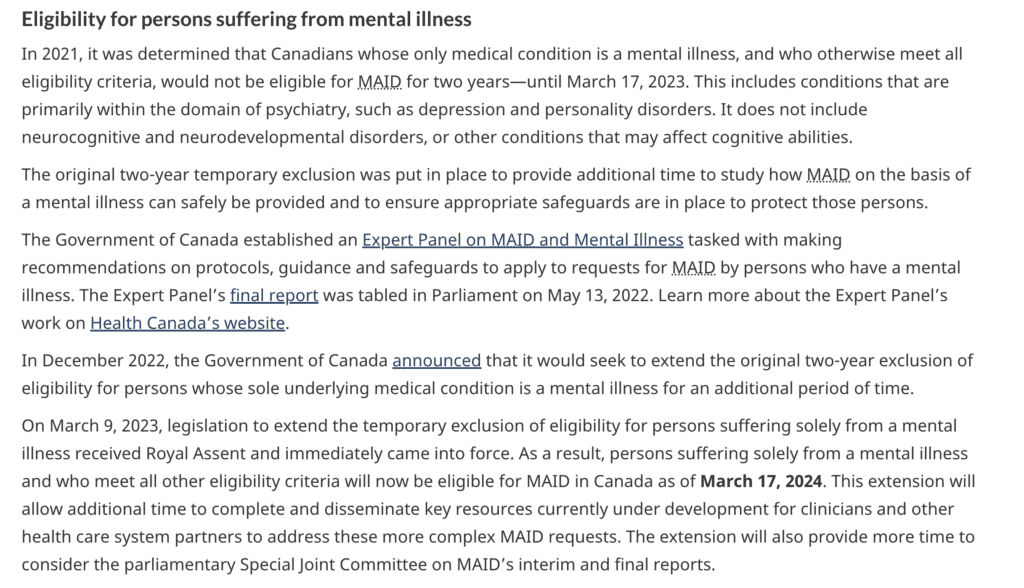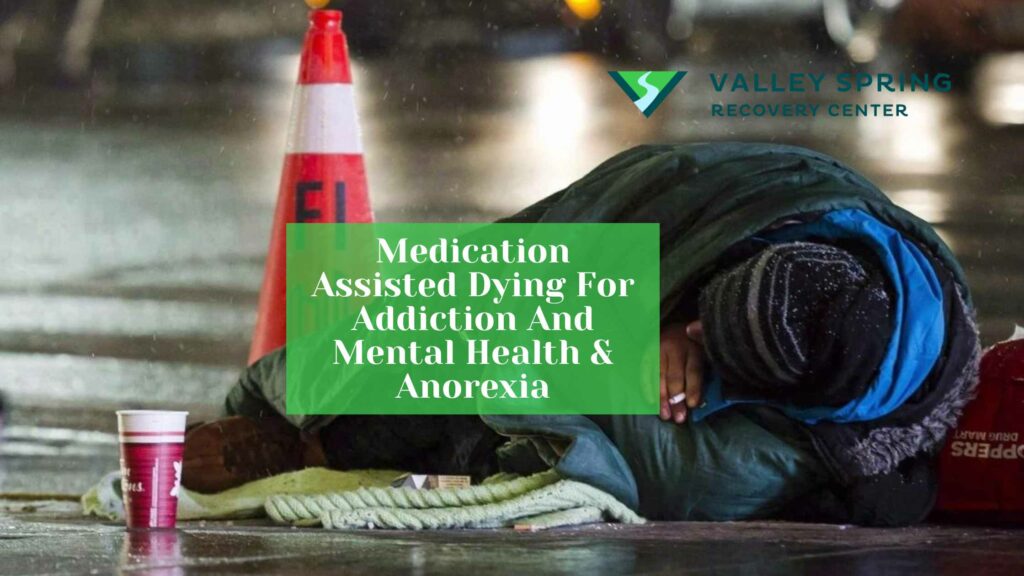
Canada has recently announced its intention to expand the Medical Assistance in Dying (MAID)also referred to as Assisted Suicide laws next spring, to include individuals who are addicted to drugs and other mental health conditions like depression and anorexia. This proposed change has stirred up a range of reactions, with some labeling the move as “eugenics,” while others see it as a way to treat all individuals equally, irrespective of the nature of their medical condition. In this article, we will explore what this means for the future of addiction treatment, ethics, and public health.
What is MAID?
Medical Assistance in Dying (MAID) is the medical practice where a healthcare provider administers or prescribes medication to hasten the death of a terminally ill patient. This practice is strictly regulated and usually requires the patient to meet certain criteria, which often include experiencing unbearable suffering and having a condition that’s considered incurable. For the first time, Canada is considering changing its policy to allow drug addicts to partake in MAID which has sparked extreme controversy and debate.
What Is The Criteria for MAID Addiction?
While the criteria for MAID can vary by jurisdiction, common requirements often include:
- Adult status (usually 18 years or older)
- A diagnosis of a terminal or incurable condition
- Mental competence to make healthcare decisions
- Enduring and unbearable suffering
- Written and verbal consent from the patient
Where Has MAID Been Legalized?
MAID has been legalized in various parts of the world, including but not limited to:
- Canada: First legalized in 2016, Canada’s MAID program is considered one of the most comprehensive. A proposed expansion may include individuals with substance use disorders.
- Netherlands: One of the first countries to legalize euthanasia, the Netherlands has comprehensive laws around MAID.
- Belgium: Like the Netherlands, Belgium has legalized MAID, including for minors under certain conditions.
- Switzerland: Known for its liberal laws concerning assisted dying.
- Several U.S. States: Including Oregon, Washington, California, Colorado, Hawaii, Vermont, and the District of Columbia.
What Is The Current State of MAID in Canada For Drug Addiction?
Initially enacted in 2016, Canada’s MAID law allows for medical assistance in dying for individuals suffering from a “grievous and irremediable medical condition.” These conditions typically include severe illnesses or disabilities but exclude mental illnesses. The expansion to include drug addiction as a qualifying condition opens up a plethora of ethical and medical questions. The Canadian government’s justice website states that persons suffering solely from a mental illness including substance use disorder will be able to apply to kill themselves with medical assistance starting on March 17, 2024.

The Ethical Dilemma With Assisted Suicide For Drug Addiction And Mental Health Disorders

Dr. David Martell, a physician lead for Addictions Medicine at Nova Scotia Health, argues that it is unfair to exclude individuals from MAID just because their suffering stems from a mental disorder, such as substance use. On the flip side, harm reduction advocates like Zoë Dodd believe that this move is rooted in eugenics and does not offer the kind of support and help needed for people struggling with substance use.
“I can’t believe this is real. We see hundreds of patients a year come in at their rock bottom, the worst state possible. But they get better. Considering killing someone because they have an addiction is not only sad but an extremely dangerous precedent for a country like Canada to set.”
Brian Cellary, CEO of Valley Spring Recovery Center
What does MAID Mean for Addiction Treatment?
The broader implication of this move calls into question the adequacy of current addiction treatment options. Critics argue that rather than providing an option to end life, the focus should be on improving public health measures and harm reduction like overdose prevention sites, opioid agonist medications, and access to housing, employment, and drug and alcohol rehab.
What Criteria Must Patients Meet to Qualify for MAID in Canada?
To qualify for Medical Assistance in Dying (MAID) in Canada, patients must meet stringent criteria. These include being a competent adult who voluntarily requests this option, has a grievous and irremediable medical condition, experiences intolerable suffering, and gives informed consent. With the proposed expansion, drug addiction may become a qualifying condition, a significant shift in eligibility criteria.
What Are The Different Names for Medication-Assisted Dying?
The names for medication-assisted dying are listed below:
- Physician-assisted death (PAD)
- Medication Assisted Death
- Assisted Suicide
- Medication Assisted Suicide
How Will the Inclusion of Drug Addiction in MAID Impact Addiction Treatment Approaches?
Including drug addiction in MAID may fundamentally alter addiction treatment approaches. It could lead to increased focus on palliative care options for addiction, while also sparking debate about the adequacy of current addiction treatment services and the need for more comprehensive and accessible treatment strategies.
What Are the Ethical Implications of Extending MAID to Drug Addicts?
Extending MAID to drug addicts raises complex ethical questions. It challenges the principles of medical ethics, particularly regarding the role of healthcare providers in end-of-life care. There’s a debate over whether it’s ethical to equate the suffering from drug addiction with that of terminal illnesses, and concerns about potential impacts on vulnerable populations.
How Does Canadian Law Currently Regulate Medical Assistance in Dying?
Canadian law regulates Medical Assistance in Dying under strict legal frameworks to ensure it’s carried out ethically and responsibly. The process requires thorough assessments by healthcare professionals, mandatory waiting periods, and explicit consent from the patient, ensuring that the decision is voluntary and well-considered.
Could This Policy Change Affect Public Perception of Drug Addiction?
This policy change could significantly impact public perception of drug addiction. It may lead to greater recognition of the severity of addiction as a medical condition, while also prompting concerns about societal attitudes towards individuals struggling with addiction and the value placed on their lives.
What Are the Arguments Against Including Drug Addiction in MAID?
Arguments against including drug addiction in MAID focus on concerns about the permanence of the decision, potential coercion, and whether addiction should be viewed as a terminal condition. Critics argue that this move might reflect a failure to provide adequate support and treatment for those struggling with addiction.
How Might This Change Influence Healthcare Policy and Practice in Canada?
The inclusion of drug addiction in MAID could have broad implications for healthcare policy and practice in Canada. It may lead to revised guidelines for healthcare providers, impact funding and resources for addiction treatment, and prompt a reevaluation of healthcare policies related to end-of-life care.
What Support Systems Are Available for Drug Addicts in Canada?
Canada offers various support systems for drug addicts, including rehabilitation centers, counseling services, harm reduction programs, and community-based support groups. The policy change may bring attention to the need for expanding and improving these services to better address the complexities of addiction.
What Role Do Healthcare Providers Play in the MAID Process?
Healthcare providers play a crucial role in the MAID process. They are responsible for assessing eligibility, ensuring informed consent, providing counseling and support, and administering or prescribing the necessary medications, all while adhering to ethical and legal standards.
How Will This Policy Change Impact Research on Addiction and End-of-Life Care?
This policy change could spur new research on addiction and end-of-life care, focusing on understanding the impacts of MAID on patients with drug addiction, exploring alternative treatment methods, and examining the long-term outcomes of such policy shifts on public health and social welfare.
Implications for the U.S. and Valley Spring Recovery Center
While the proposed changes are specific to Canada, they could influence policy discussions and public opinion globally, including here in the U.S. At Valley Spring Recovery Center, a drug and alcohol rehab center in Bergen County, NJ, we are committed to providing comprehensive addiction treatment options that focus on rehabilitation and quality of life improvement.
Get Started With Addiction Recovery With Valley Spring Recovery Center
The proposed expansion of Canada’s MAID law to include drug addicts is a contentious issue that raises ethical, medical, and societal questions. While the debate continues, it is crucial to focus on improving addiction treatment options and public health measures to support those struggling with substance use disorders.
For more information on addiction treatment options, contact us at Valley Spring Recovery Center.
Discover more from reviewer4you.com
Subscribe to get the latest posts to your email.





